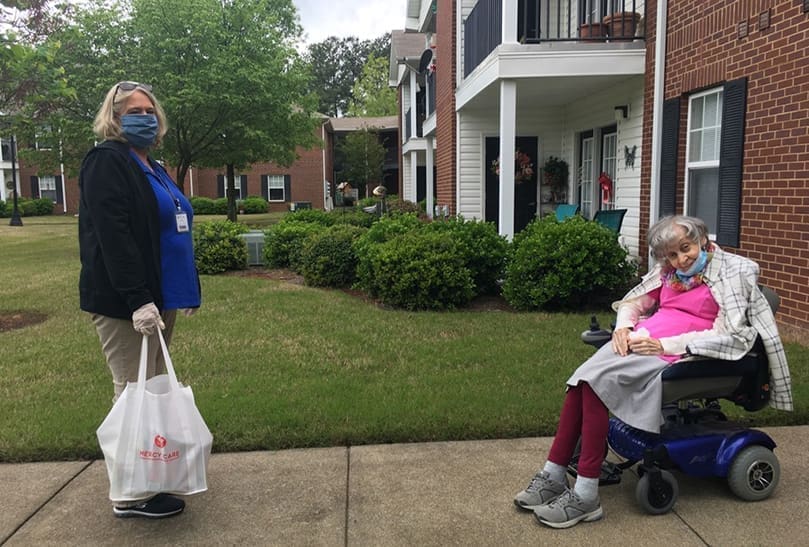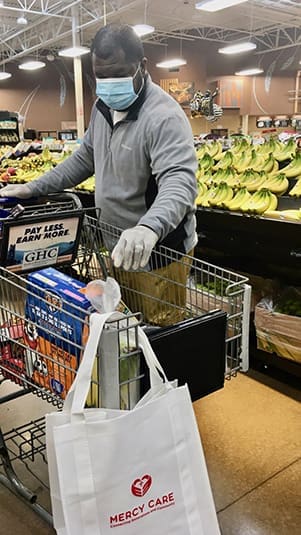 Photo Courtesy of Mercy Care Rome
Photo Courtesy of Mercy Care Rome
Rome
Mercy Care Rome provides safety net for seniors during pandemic
By ANDREW NELSON, Staff Writer | Published April 30, 2020
ROME—Terri Miller and Charles Gardner showed up around 7 a.m. to be first among the shoppers at a Rome Kroger store. Cart in hand, they picked up bananas, canned tuna, wheat bread, bottled water and oatmeal as they shopped for seniors safe at home.
Then it was back to the Mercy Care Rome kitchen, where the bags were sorted and food divvied up for the day’s four deliveries. In addition, the deliveries included colored pencils, a meditation coloring book and a relaxing adult activity book.
“You are kind of like the high point of their day. They can hear my van coming down the street,” said Miller about making home visits to someone’s dad, mother or grandparent and leaving bags of staples on their doorsteps.
The new coronavirus shut the day program for senior citizens at Mercy Care Rome. But staff members are still caring for their elderly clients, one of the most vulnerable groups during this pandemic. Like others, these folks are told to shelter in place and limit trips to stores and public places.
The nonprofit is a branch of Mercy Care in Metro Atlanta which looks after immigrants, the homeless and working poor who have no health insurance. In Rome, about 80 miles west of Atlanta, the focus is serving the elderly. About 500 seniors every year rely on the center for enrichment, meals and friendships.
A $2,500 grant from Rome’s Heart of the Community Foundation was repurposed for subsidizing grocery bills. Instead, it pays for food for seniors now that they are isolated at home and risk getting seriously sick from the virus.
“We had to think out of the box. They needed food. We wanted to serve. It was in everyone’s best interest we find a way to do this,” said Liz Molina, the executive director, in a phone interview.
The donors were happy to see the money put to use, she said.
“They were very grateful,” said Molina. “They said just do whatever you need to do. Everyone has been very supportive of our efforts.”
In fact, board members and community partners pitched in to raise $2,000, which nearly doubled the grant. An advocate for the organization raised an additional $2,000 from area churches and other organizations to buy word puzzles, coloring books and other enrichment activities. Those books and activities go into the grocery bags to keep people’s minds busy.
Barbara and Howard Homer welcomed the groceries.
“Tell everyone involved, ‘thank you.’ It brought tears to our eyes,” said Howard, who takes care of his wife, a Mercy Care client for three years.
In addition to food orders, the center staff is calling to do depression assessments and making sure everyone has enough cellphone minutes to keep in touch.
Gardner, 34, is the center’s program coordinator. He’s worked here for about seven years.
“Their reaction is always happy. They are always happy and very, very grateful,” Gardner said about seeing people from a safe distance.

Charles Gardner, the program coordinator for Mercy Care Rome, shops for groceries for senior clients who are unable to safely leave their homes during the pandemic. After he tackles the shopping, Gardner is on the road to deliver the food. Photo Courtesy of Mercy Care Rome
Miller, 58, has gotten to know the clients well. She drives to their homes to pick them up, take them to doctor’s appointments and returns them after the day is done.
“I didn’t hesitate. I was glad to do it,” said Miller about shopping for others.
When the center closed in the middle of March, it meant seniors would no longer be served breakfast and lunch here. That’s a problem.
A 2017 report “The State of Senior Hunger in America” placed Georgia as tenth in the nation for the prevalence of a threat of hunger in older adults.
The elderly are at elevated risk for serious illness and death from COVID-19.
Floyd County, where Rome is located, has had nine deaths from the virus, as of April 24. The youngest victim was a 62-year-old man. One third of Georgia patients with confirmed COVID-19 cases are older than 60.
Molina is a trained nurse with a graduate degree in gerontology. Her voice broke with emotion as she talked about the people she sees as her family.
“I want them to have a safety net. We are still thinking about them,” she said. “We are waiting to reopen. I’m very passionate.”
For Gardner and Miller, their shopping days are Mondays, Wednesdays and Fridays. The day before, they call from a list of clients to take orders. Everyone gets about $25 to $30 worth of food.
The two load up the vans and head off around 9 a.m. Masked and wearing gloves, Miller and Gardner each drive a 12-passenger van and are on the road for around an hour. It is tough to see the people they know well and not give them a hug, but they make a point to say a quick hello—sometimes behind a closed door—before they’re off to the next stop.
“They really miss being here. They can’t wait to get back,” said Gardner.